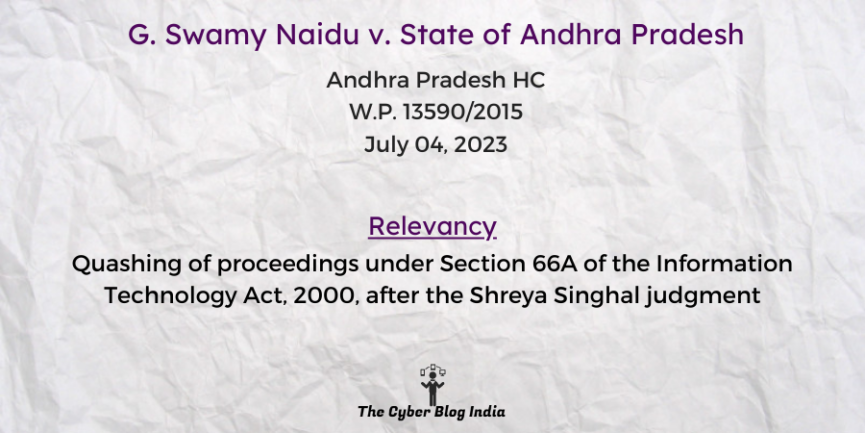G. Swamy Naidu v. State of Andhra Pradesh

G. Swamy Naidu v. State of Andhra Pradesh
In the High Court of Andhra Pradesh
W.P. 13590/2015
Before Justice K. Sreenivasa Reddy
Decided on July 04, 2023
Relevancy of the case: Quashing of proceedings under Section 66A of the Information Technology Act, 2000, after the Shreya Singhal judgment
Statutes and Provisions Involved
- The Information Technology Act, 2000 (Section 66A)
- The Indian Penal Code, 1860 (Section 507)
- The Code of Criminal Procedure, 1973 (Section 95, 96, 196, 199)
- The Constitution of India (Article 19)
Relevant Facts of the Case
- The Director of Industry Institute Interaction and Training & Placements at JNTU, Kakinada, filed a complaint with the police. Based on this complaint, the police registered an FIR.
- The complaint alleged that the Vice Chancellor of JNTU received five to six emails per day from fictitious email IDs. These emails made allegations against some employees and disrupted the administration.
- On January 05, 2014, an anonymous email alleging misconduct by the university administration was sent to the Hon’ble Governor of Andhra Pradesh, state officials, and JNTUK staff.
Prominent Arguments by the Advocates
- The petitioner’s counsel argued that Section 66A of the Information Technology Act, 2000, is not applicable. The Supreme Court struck it down in Shreya Singhal v. Union of India.
- The respondent’s counsel contended that the FIR contained specific accusations that required investigation. He further argued that the investigation or trial should determine the veracity of these accusations.
Opinion of the Bench
- Determining the veracity of accusations at this preliminary stage is not appropriate. An investigation is necessary to proceed with the allegations under Section 507.
Final Decision
- The court quashed the FIR concerning Section 66A of the Information Technology Act, 2000, while allowing proceedings under Section 507 of the Indian Penal Code, 1860.
